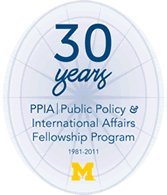PPIA at 30 Years: The Ford School Celebrates
Date & time
Location

2:00pm – 3:00pm – Alumni Panel
3:00pm – 4:00pm – Anniversary Reception
Great Hall (Weill Hall)
Free and open to the public.
This year marks the 30th anniversary of the Public Policy & International Affairs program – a program designed to build diversity in public service. The University of Michigan's Gerald R. Ford School of Public Policy has proudly supported PPIA since its inception in 1981 and has been one of just a handful of policy schools to host the educational initiative every summer. To celebrate the milestone and recognize the many people who have contributed to the program at the University of Michigan over the years, we'll host an anniversary celebration here at the Ford School on Friday, July 22.
Three distinguished Ford School alums will reflect on the impact of PPIA on their own careers and share career insights with this summer's seventeen Ford School PPIA students.
Sukhi Dosanjh (MPP '01), U.S. Agency for International Development (USAID)
Ms. Dosanjh received her Bachelors in Social Welfare and Community Health from UC Berkeley in 1998, and focused her studies on addressing issues of health care discrepancies within immigrant communities. While at Berkeley, she interned with the National Asian Women's Health Organization. After graduation, she interned at the Center for Health and Social Studies in South Africa before coming to the University of Michigan's Gerald R. Ford School of Public Policy. Sukhi graduated from the Ford School in 2001 and joined the U.S. Agency for International Development (USAID). Early in her tenure at USAID, Sukhi focused on Haiti, Dominican Republic, Guyana and Ghana. She then became a Food for Peace Officer covering Mozambique, Madagascar, Malawi, and Zimbabwe. Most recently, Sukhi was in Afghanistan, managing a $225 million foreign aid program designed to help Afghan farmers learn to grow and manage crops such as pomegranates, grapes and apricots as alternatives to the lucrative poppy industry.
Carol Kim
Carol Kim (MPP '99), Manager of Communications and Public Affairs, Health Net, Inc.
Prior to her current job, Ms. Kim worked as health deputy for Los Angeles County Supervisor, Zev Yaroslavsky, where she oversaw the strategic direction, management, and fiscal operation of a $4 billion public health care system-the nation's second largest. Earlier in her career, Kim was a policy advisor and legislative fellow for the Office of Senate Majority Leader, Tom Daschle, and a senior advisor to the assistant secretary at the U.S. Department of Treasury. Her areas of expertise include advocacy, budgeting, conflict resolution, government relations and lobbying, health and nutrition, immigration, nonprofit management, politics and campaigning, public management, poverty and social welfare, race and ethnicity, urban policy, and health information technology.
Alfonso R. Salazar (MPP '95), Senior Manager, Public Sector, Strategic Relationship Management, Deloitte Services LP
Alfonso R. Salazar
Mr. Salazar is a recognized expert in government and technology with more than 13 years of experience as a government executive. He currently manages the public sector practice in the Pacific Southwest at Deloitte Services LP. His clients include Los Angeles County, Orange County, San Diego County, Maricopa County (AZ) and the City of Los Angeles. Additionally, Mr. Salazar serves as the Southern California Regional Advisory Board chair for College Summit, Los Angeles – a secondary school college preparatory program dedicated to increasing low-income students' college enrollment rates.
Prior to joining Deloitte, Mr. Salazar served as President of ARS Solutions, an information technology and business development firm dedicated to providing efficient solutions to both the public and private sectors. He was appointed by Governor Gray Davis and served as Acting-Undersecretary for the California Technology Trade and Commerce Agency – the State's principal catalyst for innovation, investment, and business opportunities. In this role, he directed the day-to-day management of the $350 million Agency, overseeing its budget, personnel, strategic planning, and operations; advised the Governor's office on trade policies, economic development, and technology matters; and directed numerous programs that stimulated economic activity for international trade and investment, research and development, and commercialization of new technologies. He was appointed by Mayor Richard Riordan and served as director of the Los Angeles Business Team, Office of the Mayor. Mr. Salazar received his Master of Public Policy from University of Michigan and earned his B.A. from University of California, Berkeley. He resides in Whittier, CA with this wife Angela Acosta-Salazar and three sons, Alfonso, Lorenzo and Rafael.
About the PPIA program
The Public Policy and International Affairs Program (PPIA) is a national program that prepares undergraduate students for an advanced degree and ultimately for careers of leadership and influence in public service.
The keystone of the PPIA program is an intensive seven-week summer program that prepares students for graduate programs in public and international affairs – and for careers as policy professionals, public administrators and other leadership roles in public service. The curriculum includes economics, statistics, domestic/international policy modules, and leadership topics, all designed to sharpen the students' quantitative, analytic and communication skills.
PPIA has an outreach focus on students from groups who are underrepresented in leadership positions in government, nonprofits, international organizations, and other institutional settings. This focus stems from a core belief that our citizens are best served by public managers, policymakers and community leaders who represent diverse backgrounds and perspectives. For thirty years PPIA has been at the forefront of promoting diversity in public service and nurturing the full potential of students as active citizens, public servants, and agents of change.
More about the history of the PPIA program.